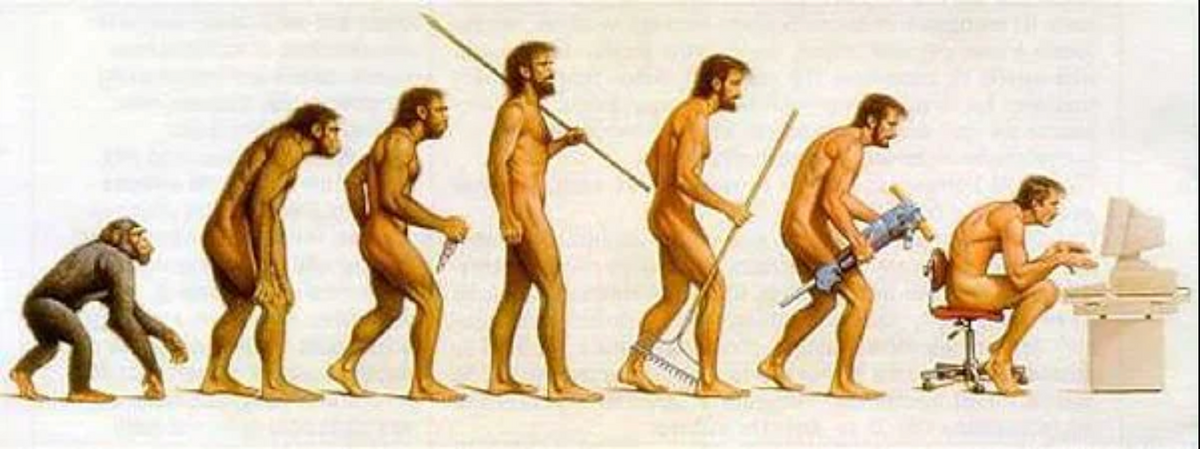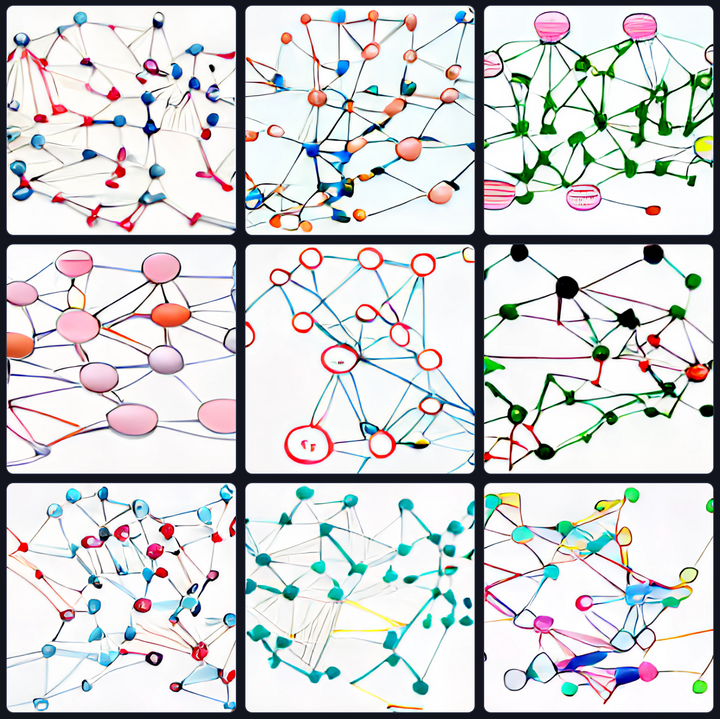Basal Meaning - Part 1 - Meaning deserves a proper origin story

Whenever we notice a useful function–memory, vision, audition, emotion, language, abstraction–we should be immediately reminded that this function followed a long and wending path to be so ubiquitous that we notice it at all. Much has been said about the origins of these and each has sparked a series of warring hypotheses to explain how they came from systems that did not have them at all. For example, language people have aligned themselves with some combination of origin stories:
- Bow-wow, pooh-pooh, ding-dong, yo-he-ho, ta-ta[1]: Some set of sounds from nature (other animals, sound symbolism, affect, resonance) got picked up and adapted over time–from constructions of these came words and from words came language.
- Primal shouting: Like other social creatures, our ancestors lived in groups that learned to shout specifically in order to avoid danger (e.g., lions, tigers, bears, or worse–other humans). Those who shouted too vaguely died out and those who learned to shout and heed the shouting thrived.
- Humanistic/platonic theories: We came up with/discovered language in order to communicate our lofty thoughts.
- Single-step theory: Given we futzed about for hundreds of thousands of years with little cultural progress and then suddenly built civilizations all over, there must have been some big, single mutation/innovation that unleashed our pent up possibility of language.
- And so on–there are dozens of competing ideas, some of which overlap but many of which do not.
Given the impossibility of empirical confirmation of one or another, contrasting origins of language will occupy us as long as we can be bothered to be occupied by them. Our interest here is not in resolving them but in considering why we feel a need to answer the question in the first place. Being generous and thinking there's a useful purpose at the end of this inquiry[2], we might say something like this: understanding the origins of language will help us better understand language and its future. This thought holds true for the other functions I mentioned–memory, vision, audition, emotion, and abstraction. We know that these are possible functions found in the universe. Knowing this, we can begin to think about how and why they have emerged from the æther.
Meaning is another fundamental function just like language, memory, emotion, etc. It might not seem this way at first. Partly, it's because we romanticize it in language and culture–just like, well, love. Yet, love and meaning are both things that serve a function and are ubiquitous. Just because the words "love" and "meaning" are used chaotically does not mean that they do not have origins worthy of careful scientific deliberation. In fact, their murkiness is all the more reason to consider them more carefully, as this murkiness often leads to neglectedness in science[3]. In other words, though we (as regular humans) talk about memory and language and vision about as much as we talk about meaning, science does not mirror this because science does not know how to deal with meaning. We won't go into every why here, but I suspect that part of science's squeamishness around meaning stems from its inability to ground meaning in any kind of useful historical narrative. Though anthropologists and other social sciences may touch on meaning as an aspect of culture, they do not (as far as I am aware) have much interest in grounding meaning-making in a manner similar to what the language people have done. There are no fiery, endless debates about the origins of meaning. This is a problem.
We might be tempted to think that the absence of origin theories is itself evidence of absence–how else could such a thing go unnoticed by the history's luminaries? Instead, I think the absence has several causes that compounded each other:
- Religion and theology have sucked the oxygen out of the room
- Structure ontologies are ill-equipped for addressing processes like meaning-making
- Emotion research has gobbled up anything that has affective qualities
- Empirical methods have latched onto a hedonistic paradigm (pleasure vs pain) as central to experience
These causes make talking about meaning-making a complicated and drawn-out exercise. We'll expand and discuss each, before moving on.
1 - Religion and theology
Part of the religious confusion comes from how "meaning" is used in a general sense. We ask "What is the meaning of life?", thinking that a well-formed question–and religions answer it seriously. This question is not scientifically sensible, as it assumes that the universe has some teleological intention for us. Instead, an scientifically safe and subtly different question is possible: "What is the meaning in life?". Or, more specifically, "How is it that and in which ways is life meaningful?". In principle, this is scientifically answerable. The issue is that science needs to specify this every time it starts a conversation about meaning–and even then, those with religious mental models will find themselves anchored to the "meaning of life" sense. A solution that I've tried in the past has been throwing away the word "meaning" and instead using some other word (for me, eudaemonia). This can help at face value but then puts us into jargon and conceptual drift territory. In the end, the only thing that matters is that we communicate our concepts clearly–but religion's historical chokehold makes this unusually difficult.
2 - Structure vs process ontology
This is a wider issue for cognitive scientists, but we have a strong tendency to demand that we be able to point to and look at specific objects that we can confidently call the thing we're talking about. Perhaps most notoriously, consciousness has been difficult to "find" in any structural sense. This is also true of everything else that is about qualitative experience, including affect, pain, pleasure, and primal emotions (like fear). Science expected we'd be able to find clear and obvious physical goings-on that were isomorphic to the experience–that is, we wanted to see pain neurons and pleasure neurons and fear neurons and so on.[4] This approach doesn't work. Instead, there's been a shift away from modular, simple cause-effect loops towards complex, dynamical approaches. These suggest that we can't simply point at circuits and call those an experience but that experience is found as the process unfolds over space and time. Prior to this shift, meaning (like consciousness) found itself without accepted ontological support.
3 - The emotion elephant
In part due to (2), emotion has long served as a halfway house for anything that has to do with affect. If anything is felt, it can be called an emotion and can therefore be brought into the emotion literature, which was able to establish itself as empirical science due to the behaviorists (i.e., the people who put rats and chimps and mazes). Meaning gets lumped in with happiness, awe, pleasure, joy, wellbeing, connection, harmony, calmness–and so on and on. By becoming one with the monolith, meaning can be treated as legitimate and worthy of study–or so some might[5] say. I flatly reject this. Meaning is not usefully reducible to any other emotion. Moreover, meaning ought not to be reduced to emotion at all (this will be addressed later on).
4 - The hedonistic paradigm
For historical reasons outlined in (2) and (3), it is common to reduce human feelings into a pair of properties: pleasure and pain. The appeal is easy to understand–if we can reduce everything to these, we can do things like utilitarian math to determine moral behavior. We can also be objective when making difficult medical decisions such as euthanasia or abortion. It lets us compare different kinds of organisms and create neater ethical frameworks than would otherwise be possible. However, it is an over-reduction. In this work, I won't go into the many ways in which this reduction is fraught. Suffice it to say that the hedonistic framework treats meaning as unworthy of consideration, a kind of distracting illusion that prevents us from seeing the stark, two-dimensional truth. This is not to say that I think pain and pleasure are unrelated to meaning-making. On the contrary, they are necessary sources of information for meaning. But they are mere sources of information–they are not the thing that we care about–meaning is.
Meaning deserves its own origin story. It is not an unanswerable red herring (1), is describable in process-related terms (2), cannot be reduced to a mere emotion (3), or ignorable in our moral theories (4).
In the following piece, we will present a potential evolutionary grounding for the emergence of meaning. By way of preview, we propose that meaning comes straightforwardly from scale-free, goal-directed agential behavior seen at all levels of biological organisms. As complex cognitive abilities emerge (short and long-term memory, language, abstraction, culture), meaning in turn becomes more complex and capable–and, critically, gives reason for experience to have affective qualities. In other words, meaning begets consciousness[6].
Footnotes
Yes, these are all real and were taken seriously at one point or another ↩︎
Indirect evidence for this is found in comparing the amount of attention paid to different cognitive/neural functions: by and large, language, vision, and memory sciences dominate the field in a way that should be alarming. They get almost all the funding and attention, leaving everything else on the fringe. You might think this is because they are the most important in some general survivalist sense, which is clearly false. They get funding because (among other reasons) they are seen as concrete problems with solutions that can follow from straightforward approaches. ↩︎
The less-generous version is that linguists et al. are just bored and this debate gives their careers some much-needed zest. ↩︎
This thinking still pervades much of neuroscience, though it is slowly shifting as we come to recognize we're bad at making affective predictions from looking at neurons and further improvements with current approaches will yield minimal improvements with exponential cost increases. ↩︎
Not naming names here, but I have been directed to anchor meaning to other emotions by more than one reputable scientist. ↩︎
This is of course a loose, pithy statement–but it's not that loose. The process of meaning-making seems to depend on things feeling a certain way. ↩︎


